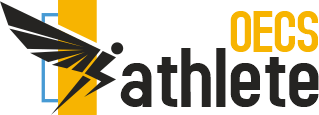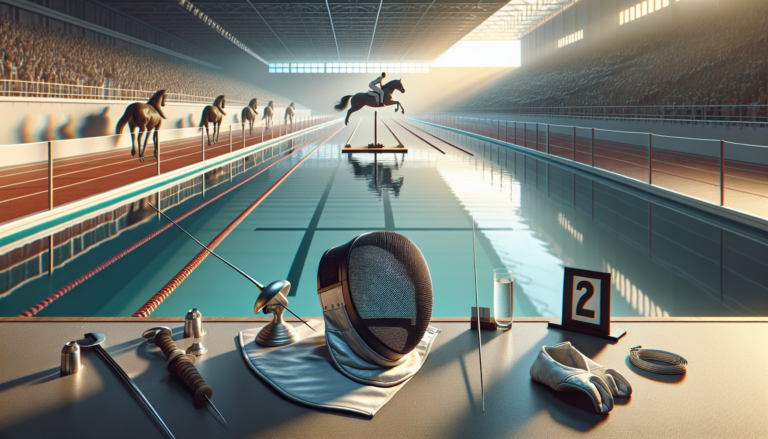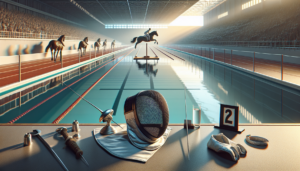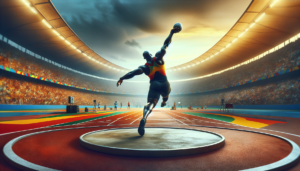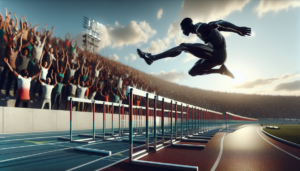Introduction to Modern Pentathlon
Modern pentathlon is a unique and challenging Olympic sport that combines five diverse disciplines: fencing, swimming, equestrian show jumping, and a combined event of running and shooting. This multi-faceted sport tests athletes’ physical prowess, mental fortitude, and adaptability across a wide range of skills. The modern pentathlon has a rich history dating back to the early 20th century and continues to evolve, with significant changes planned for the upcoming Olympic Games.
As a core event in the Olympic program, the modern pentathlon attracts top competitors from around the world who strive to master the five disciplines and claim the coveted gold medal. The sport demands rigorous training, strategic thinking, and the ability to perform under pressure, making it a thrilling spectacle for audiences and a true test of athletic excellence.
What is Modern Pentathlon?
Modern pentathlon is a multi-sport event that challenges athletes to compete in five distinct disciplines: fencing, swimming, equestrian show jumping, and a combined event of running and shooting. The sport is contested in both individual and team formats, with separate events for men and women. Athletes accumulate points based on their performance in each discipline, and the overall winner is determined by the highest total score.
The modern pentathlon is designed to showcase the versatility and well-rounded abilities of athletes, reflecting the skills and qualities that were valued in soldiers during the early 20th century. The combination of diverse disciplines requires athletes to master a wide range of techniques, demonstrate physical endurance, and exhibit mental agility and composure throughout the competition.
History of Modern Pentathlon
The modern pentathlon has its roots in the ancient Olympic Games, where a similar event was held to test the skills of soldiers. However, the sport as we know it today was introduced in 1912 by Baron Pierre de Coubertin, the founder of the modern Olympic Games. De Coubertin believed that the modern pentathlon embodied the ideal of the complete athlete, combining the essential skills of a soldier: riding, shooting, fencing, swimming, and running.
The first modern pentathlon competition was held at the 1912 Stockholm Olympics, and the sport has been a fixture in the Olympic program ever since. Initially, the event was only open to male military officers, but it later expanded to include civilian athletes. Women’s modern pentathlon was introduced as an Olympic sport in 2000 at the Sydney Games, further broadening the appeal and competitive landscape of the sport.
The Five Disciplines of Modern Pentathlon
Fencing
The fencing discipline in modern pentathlon is a round-robin épée competition, where each athlete faces every other competitor in one-minute bouts. Points are awarded for each touch scored, with the objective being to score as many hits as possible. The fencing event tests athletes’ speed, agility, and strategic thinking, as they must quickly adapt to different opponents and their styles.
Athletes use the épée, a thrusting weapon with a triangular cross-section blade and a large guard to protect the hand. The target area includes the entire body, and hits can be scored with the point of the weapon only. Fencing requires a combination of technical skill, tactical awareness, and mental focus, as athletes must make split-second decisions and execute precise movements to outmaneuver their opponents.
Swimming
The swimming discipline in modern pentathlon is a 200-meter freestyle race. Athletes aim to complete the distance in the fastest time possible, with points awarded based on their finish time. The swimming event tests athletes’ speed, endurance, and efficiency in the water, as they must maintain a strong pace throughout the race.
Swimmers employ various techniques and strategies to maximize their performance, such as maintaining a steady stroke rate, executing efficient turns, and conserving energy for the final sprint. The swimming discipline requires a combination of cardiovascular fitness, proper technique, and mental resilience, as athletes must push themselves to their limits while maintaining focus and composure.
Riding
The riding discipline in modern pentathlon involves show jumping over a course of 12 obstacles, with a time limit of 75 seconds. Athletes are assigned unfamiliar horses through a random draw, and they have only 20 minutes to warm up and familiarize themselves with their mount before the competition begins. The riding event tests athletes’ equestrian skills, adaptability, and ability to form a quick partnership with their horse.
Riders must navigate the course while incurring as few penalties as possible for knockdowns, refusals, or exceeding the time limit. The jumping course is designed to challenge both horse and rider, with a variety of obstacles such as verticals, oxers, and combinations. Success in the riding discipline requires a combination of technical riding ability, effective communication with the horse, and the mental composure to perform under pressure.
Running and Shooting
The running and shooting discipline, also known as the laser run, is a combined event that concludes the modern pentathlon competition. Athletes alternate between running and shooting, completing four 800-meter running legs and four shooting series. The shooting is done with a laser pistol at a target 10 meters away, with athletes required to hit the target five times before proceeding to the next running leg.
The laser run is a test of endurance, precision, and composure under pressure. Athletes must maintain a strong running pace while quickly transitioning to the shooting range, where they must calm their breathing, focus, and accurately hit the targets. The event requires a combination of cardiovascular fitness, shooting skill, and the ability to perform while fatigued. The laser run often proves decisive in determining the overall winner of the modern pentathlon competition.
Scoring and Rules in Modern Pentathlon
Scoring System
The modern pentathlon uses a points-based scoring system to determine the overall winner. In each of the first three disciplines (fencing, swimming, and riding), athletes receive points based on their performance. These points are then converted into time handicaps for the final laser run event. The athlete with the highest total points after the first three events starts the laser run first, with the other athletes starting in order based on their point totals.
In fencing, athletes receive points for each victory in their bouts, with additional points awarded for winning streaks. In swimming, points are awarded based on the athlete’s time relative to a predetermined benchmark. In riding, athletes receive points for a clear round within the time limit, with penalties deducted for knockdowns, refusals, or exceeding the time allowance. The laser run is a straightforward race to the finish, with the first athlete to cross the line declared the winner.
Rules and Regulations
Modern pentathlon is governed by the Union Internationale de Pentathlon Moderne (UIPM), which establishes the rules and regulations for the sport. The UIPM oversees the various competitions, including the Olympic Games, World Championships, and World Cups, ensuring consistency and fairness in the conduct of the events.
Some key rules and regulations in modern pentathlon include:
- Athletes must compete in all five disciplines, and failure to finish any event results in disqualification.
- In fencing, each bout lasts for one minute or until a athlete scores a hit, whichever comes first.
- In swimming, athletes must use freestyle technique and are not allowed to impede or interfere with other competitors.
- In riding, athletes are assigned horses through a random draw and have limited time to warm up and familiarize themselves with their mount.
- In the laser run, athletes must alternate between running and shooting, hitting the target five times before proceeding to the next running leg.
Training for Modern Pentathlon
Physical Training
Modern pentathlon demands a high level of physical fitness and proficiency across multiple disciplines. Athletes must engage in a rigorous and well-rounded training program to develop the strength, endurance, speed, and agility required for success. This typically involves a combination of discipline-specific training and cross-training exercises.
Pentathletes often work with specialized coaches for each discipline to refine their technique, improve their performance, and prevent injuries. Strength training, cardiovascular conditioning, and flexibility exercises are essential components of a pentathlete’s physical preparation. Athletes also focus on developing sport-specific skills, such as fencing footwork, swimming stroke efficiency, and shooting accuracy, through targeted drills and practice sessions.
Mental Preparation
In addition to physical training, modern pentathletes must also focus on mental preparation to excel in the sport. The unique challenges of competing in five diverse disciplines require athletes to develop mental toughness, resilience, and adaptability. Mental training techniques such as visualization, goal setting, and stress management can help athletes maintain focus, overcome setbacks, and perform at their best under pressure.
Pentathletes often work with sports psychologists or mental performance consultants to enhance their mental skills and develop effective strategies for coping with the demands of competition. This may include techniques for managing anxiety, maintaining concentration, and staying motivated throughout the lengthy and challenging event. By combining physical and mental training, modern pentathletes strive to achieve peak performance and success on the international stage.
Modern Pentathlon in the Olympics
Paris 2024 Olympics
Modern pentathlon will be featured at the Paris 2024 Olympics, with competitions scheduled to take place from August 8th to 11th, 2024. The event will be held across two venues: the Château de Versailles for the fencing and riding disciplines, and the North Paris Arena for the swimming and laser run events.
The Paris 2024 Olympics will mark the return of modern pentathlon to its birthplace, as the sport was first introduced at the 1912 Stockholm Games by Baron Pierre de Coubertin, who was inspired by the French military’s multi-discipline training. The competition in Paris is expected to showcase the world’s best pentathletes, with athletes from around the globe vying for Olympic glory in this challenging and historic event.
Changes for the 2028 Olympics
The modern pentathlon is set to undergo significant changes for the 2028 Olympics in Los Angeles. The most notable change is the removal of the equestrian show jumping discipline, which has been a part of the sport since its inception. In its place, the UIPM has proposed the addition of an obstacle course event, designed to test athletes’ agility, strength, and speed.
The decision to remove the riding discipline was made in response to concerns about the welfare of horses and the sustainability of the sport. The introduction of the obstacle course is intended to modernize the pentathlon and make it more accessible and appealing to a wider audience. The proposed changes have generated mixed reactions within the pentathlon community, with some athletes and fans embracing the innovation and others lamenting the loss of a traditional discipline. As the sport continues to evolve, the 2028 Olympics will mark a significant milestone in the history of modern pentathlon.
Famous Pentathletes and Records
Notable Pentathletes
Throughout its history, modern pentathlon has produced many remarkable athletes who have left their mark on the sport. Some of the most notable pentathletes include:
- Andrey Moiseyev (Russia): Two-time Olympic gold medalist (2004, 2008) and multiple World Champion.
- Ádám Marosi (Hungary): Olympic bronze medalist (2012) and World Champion (2009).
- Laura Asadauskaitė-Zadneprovskienė (Lithuania): Olympic gold medalist (2012) and multiple European Champion.
- Lena Schöneborn (Germany): Olympic gold medalist (2008) and multiple World Champion.
- János Martinek (Hungary): Two-time Olympic silver medalist (1988, 1992) and World Champion (1987).
These athletes, among many others, have demonstrated exceptional skill, dedication, and sportsmanship, inspiring future generations of pentathletes and leaving a lasting legacy in the sport.
World Records in Modern Pentathlon
Due to the multi-discipline nature of modern pentathlon and the evolution of the sport over time, world records are not officially maintained. However, there have been many remarkable performances throughout the history of the sport, with athletes setting new standards of excellence in individual disciplines and overall competition.
Some of the most impressive performances in modern pentathlon include:
- The highest individual score in the men’s competition: 1,528 points by Robert Kasza (Hungary) in 2011.
- The highest individual score in the women’s competition: 1,372 points by Laura Asadauskaitė-Zadneprovskienė (Lithuania) in 2014.
- The fastest swimming time in the men’s 200m freestyle: 1:55.70 by Pavlo Tymoshchenko (Ukraine) in 2015.
- The fastest swimming time in the women’s 200m freestyle: 2:08.31 by Aurélie Migault (France) in 2002.
As the sport continues to evolve and new generations of athletes push the boundaries of what is possible, we can expect to see even more impressive performances and milestones in the future.
Conclusion
Modern pentathlon is a fascinating and demanding sport that challenges athletes to excel in five diverse disciplines. From its origins in the military training of soldiers to its current status as an Olympic event, the sport has a rich history and a unique place in the world of competitive athletics. The combination of fencing, swimming, riding, running, and shooting tests the physical, mental, and technical abilities of competitors, making it a true showcase of skill and determination.
As the sport continues to evolve, with changes planned for the 2028 Olympics and beyond, it remains an exciting and dynamic event that captures the imagination of fans around the world. Whether you are a seasoned pentathlete, a curious spectator, or a newcomer to the sport, modern pentathlon offers a thrilling and inspiring display of athletic excellence and sportsmanship. As we look ahead to the Paris 2024 Olympics and the future of modern pentathlon, we can anticipate even more remarkable achievements and unforgettable moments from the world’s best pentathletes.
